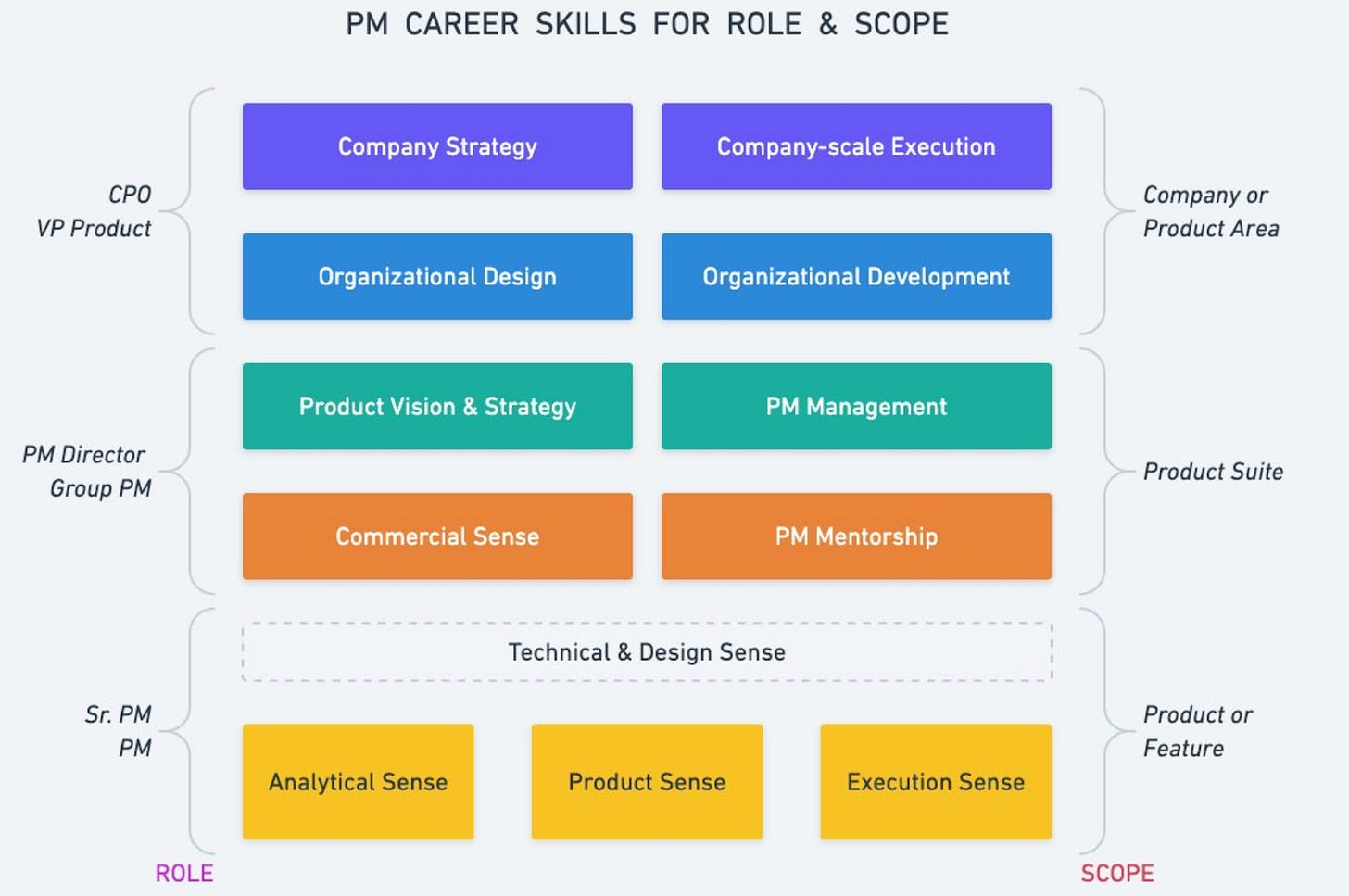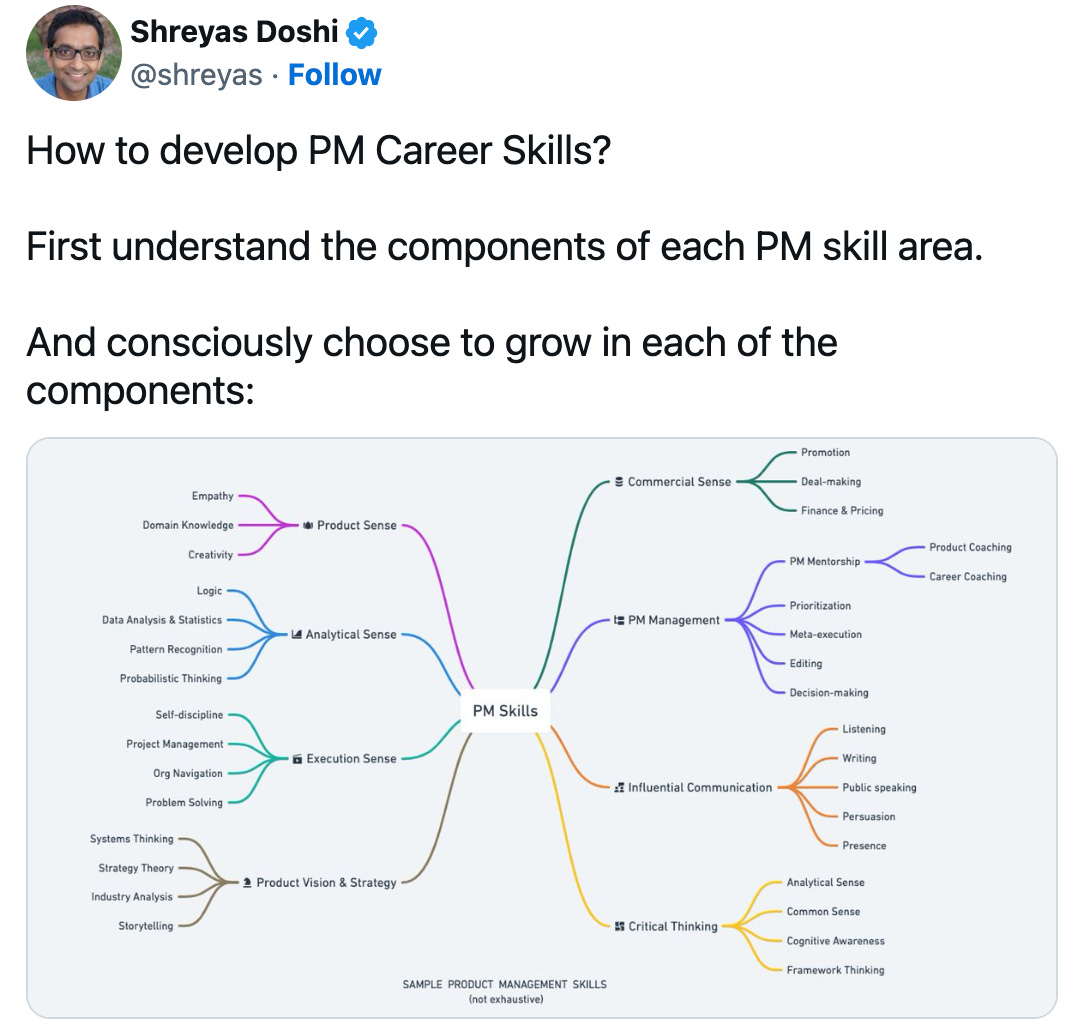How do I develop my PM Skills? What books should I read? What classes should I take?
These are all questions that I have asked many of my mentors over the years. Now, I also receive them from other PMs who have reached out to me after reading this newsletter. There are many articles and talks that have been published about this topic, but I’ve often found them either lacking in detail or overwhelming and hard to put into action.
That all changed when I found Sheryas Doshi’s PM skill map, which gives PMs a much more structured way to think about our skill development. His framework is also reassuring in that, if you keep working on one skill at a time, you can eventually become good at it.
In this Whisper, while I am using Shreyas’ skill map as an anchor point, I will be focusing more on how to learn new PM skills at a higher level, rather than on how to develop each skill individually. (If you’re interested in going deeper on a specific skill from the map, let me know, and I can make it the topic of a future Whisper!)
What skills do I need as a PM?
To start off, let’s look at Shreyas’ model of the different PM career levels and scopes, as well as what career skills are required for each:
PMs/Senior PMs: These Product Managers own a product or a set of features. Common skills required for these roles include Analytical Sense, Product Sense, and Execution Sense. Depending on the type of products you manage, you may also need strong Technical Sense and/or Design Sense.
Group PM/Director of Product Management: As you move into higher product management roles, you may end up managing a suite of products. You will need skills like Product Vision and Strategy, as well as Commercial Sense, to make sure your products are going to bring the expected results. You will likely have a team of PMs to support the work, so you will also need PM Management and PM Mentorship skills.
VP of Product/CPO: As you reach these higher roles, you will now need to start thinking at a company and product area level. You will have Product Directors to take care of product strategy and execution, so you will mainly be focusing on company-level efforts. Skills you need will likely include Company Strategy, Company-scale Execution, Organizational Design and Organizational Development.
Not depicted in this image are two other important skills that run across all levels: Critical Thinking and Influential Communication. The higher up you go, the more important these skills will become, since they will be an important part of everything you do.
How to develop your PM skills
Product Management is a great career for people who love to continuously learn and grow. Your products, your users, and your market are all constantly changing, which requires you to constantly learn and adapt. At each job and at each level, you will need to emphasize developing different skill sets in order to be successful. That’s why, if you want to be a good Product Manager, it’s important to hone your ability to pick up new skills.
I am a strong believer in our ability to get good at almost anything with enough deliberate practice. While the concept of deliberate practice has been used in things like sports and music, many of us don’t apply it to our jobs.
Let’s go through a systematic framework for using practice to help us build our PM skills:
1. Break down PM skill sets into component skills
We can continue to use Shreyas’ model here as a frame of reference. In order to make skill development manageable, you will want to start by identifying the component skills that go into each skill area you want to improve.
For example, a very common question I’ve gotten from PMs is, “How can I develop product sense?” Such a complex and abstract skill can seem hard to learn. However, if we know that in order to have good product sense, you need to have strong empathy, deep domain knowledge, and creativity, suddenly it becomes much easier to find ways to improve this ability. By breaking skills into more approachable sub-skills, you can tackle them bit by bit and make them less intimidating.
Pick one skill at a time. This is more of a personal preference, but I find that it’s much easier to hone my PM skills when I focus on practicing one skill at a time. Deliberate practice is a long-term commitment. It’s about consistency and perseverance, pushing our personal boundaries and stepping out of our comfort zones. As PMs, our day-to-day jobs are already stressful enough. Therefore, working on one skill (or one set of closely-related component skills) at a time can make it more manageable and help prevent burnout.
I have also found that this is helpful for many of the PMs I’ve mentored. For example, a lot of them have shared with me that they want to work on honing their skills in product strategy. At Instagram, landing a good product strategy requires a PM to come up with a strong, data-informed product vision packed with UX design mock-ups, and to make sure their strategy is aligned with different stakeholders. This involves a lot of skills: product sense, analytical sense, product vision and strategy, critical thinking, and influential communication. As a result, it can feel very overwhelming.
However, when my mentees instead break it down and focus on tackling one skill at a time, it becomes much more tractable. For instance, we might first focus on analytical sense and product sense in order to prepare all the insights needed for a successful product strategy. We might then use critical thinking and storytelling to put together a narrative, then work on influential communication to make sure the strategy reviews go well. By focusing on one skill at a time, we are able to make it more achievable and enjoyable while delivering high-quality results.
Seek expert guidance. When you’re learning a new skill, it’s important to make sure you’re practicing it the right way. Look around for people who have the skills you want to learn, and observe them in action or ask them to give you some tips. It can also help to read books that go deep into each topic with practical frameworks and real-life examples. Each person has a different learning style, so experiment until you find the approach that works for you.
I personally love learning from books. For example, in order to improve my influential communication skills, I read books that teach each of the component skills, such as:
Listening: Humble Inquiry, The Gentle Art of Asking Instead of Telling by Edgar Schein
Writing: The Pyramid Principle: Logic in Writing and Thinking by Barbara Minto
Public speaking: Talk Like TED: The 9 Public-Speaking Secrets of the World's Top Minds by Carmine Gallo
Persuasion: Influence, New and Expanded: The Psychology of Persuasion by Robert B. Cialdini
Presence: Presence: Bringing Your Boldest Self to Your Biggest Challenges by Amy Cuddy
I listed out the books in this example to show you the depth of each component skill. I tend to avoid books that promise to teach you a skill overnight. Over the years, I have learned that there is no such thing as a free lunch; strong skills don’t come easily, and I have found that the more I can enjoy and trust the learning process, the better the results are that I can get.
I have a good friend (he’s my previous manager) who doesn’t like to learn by reading. However, he’s amazing at learning skills, either by picking them up intuitively or by observing other people who are good at them and picking out their best practices. I often joke that life is unfair when I have to read so much to learn while things seem to come so naturally to him. Therefore, it’s important to remember that you can pick up skills in whatever way works best for you. The most important thing is to figure out your preferred way of learning and stick to it.
Practice, reflect, and seek constant feedback. The hardest part of learning a new skill is to start practicing it. If you want to be a better writer, start writing. You can read a thousand books about how to write better, but until you actually sit down and write, books don’t matter that much.
Just as important is the ability to reflect and seek feedback on what you’ve learned. This ensures that you know where you are improving and where you still need to work. Remember, the quality of the feedback you get depends on the question you ask. For example, you might get less concrete feedback if you ask something general, like, “Do you have any feedback for me?” as opposed to, “I’m working on improving my execution skills. If you had to give me a grade, from A to E, which grade would you give me? What should I do to get to the next grade?”
Reward yourself. Learning is hard. It requires discipline and perseverance. It’s important to make the process as enjoyable as possible in order to keep yourself motivated and continue to learn. Rewarding yourself is an act of self-care that can foster a positive mindset. A reward could be small, like an ice cream after a week of practicing your listening skills, or a day off after you finish writing five articles. By incorporating rewards into the learning process, you can create a positive feedback loop that encourages continuous development. This can also help boost your self-confidence and contribute to your overall happiness.
…
Developing your PM skills can seem overwhelming at first, but it becomes much more doable when you can approach it more strategically. This involves breaking skills down, focusing on one thing at a time, seeking guidance, practicing and reflecting, and rewarding yourself as you go.
By adopting this systematic approach, you can enhance your abilities and thrive as a Product Manager. Remember, learning and growth are continuous processes, so embrace the journey and enjoy the rewards of your efforts.





